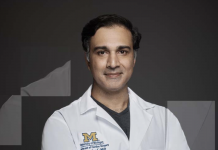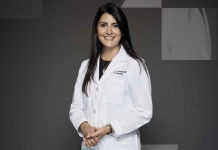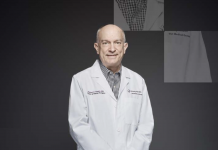
Carolyn Fascetti, a critical care nursing specialist at Henry Ford Medical Center, is responsible for teaching proper pandemic protocol to bedside nurses. Her lesson units have corresponded to the severity of the outbreak: First, she taught her team how to use protective gear. Eventually she moved on to new treatments, sedation practices in the ICU, and putting COVID-19 patients in prone position — lying face down — to help them breathe.
The day she created the module on ventilators and end-of-life, she wept — for the patients and for her staff.
“I knew what that meant for our patients and for our colleagues,” says Fascetti, who has been a nurse at Henry Ford for 37 years. “I was sad for the patients whose lives were ending sooner than they ever expected, their families suffering excruciating emotional turmoil, and sad for our nurses who needed to be the sole support for suffering patients.”
Fascetti decided to sign up for the Stronger Together Buddy Program — an initiative at Henry Ford to help medical workers cope with the emotional weight of the pandemic — which pairs up nurses, doctors, and other staff members, who then provide comfort and inspiration to one another on their toughest days. It’s just one of a suite of mental health offerings that make up an overall wellness effort. Henry Ford also offers one-on-one peer support, drop-in Zoom calls, grief support groups, and a “care cart” full of healthy snacks for workers.
When Fascetti signed up for a buddy, she hoped to help someone else. Then she realized how much she needed emotional support, too.
“Never in my 37-year nursing career had there been such a prolonged need for our staff to be intensely focused,” she says. “My heart ached for the nurses and the intellectual, physical, mental, and emotional work required of them. As the days went on, I realized the uplifting messages I was getting from my buddy were energizing me at a time I didn’t realize I needed it.”
The pandemic has taken an incredible toll on healthcare workers. They not only have been stretched to the limit with overflowing ICUs, but they also run the risk of contracting a life-threatening disease and bringing it home to their families. A May study published in the journal EClinicalMedicine found that out of nearly 21,000 U.S. healthcare workers surveyed, 61 percent had significant fear of exposing themselves or their families to COVID-19. Nearly half the workers suffered from burnout, and 38 percent said they were dealing with anxiety or depression.
And the mental health of healthcare personnel was already in jeopardy even before the pandemic. A study from University of Michigan researchers found that, according to data from 2007 to 2018, female nurses in particular were at twice the risk of dying by suicide as women outside of healthcare.
Then came COVID. The death of New York emergency department physician Dr. Lorna Breen by suicide made headlines in April 2020. “She tried to do her job, and it killed her,” her father told reporters.
Medical professionals were scrambling to draft wills and staying in hotels to protect their families, says Dr. Lisa MacLean, since 2007 the chief clinical wellness officer at Henry Ford. Pre-COVID, she helped lead monthly wellness rounds, which included talks on topics related to provider well-being while attendees enjoyed a free lunch. MacLean ramped up more of those efforts in March 2020 when critically ill patients began overwhelming hospitals across the country.
“There was always a need for this program, but the pandemic really highlighted that,” says MacLean, who personally brings the care cart of snacks to each unit. “You’ve prepaid for these in blood, sweat, and tears,” she says she tells the staff. The effort includes contributions from a wide range of Henry Ford mental health professionals including Dr. Doree Ann Espiritu, supervisor of residents on their geriatric psychiatry rotations.
MacLean hopes the pandemic has paved the way for greater focus on mental well-being among providers. “I think one thing that could potentially change is that healthcare organizations will take more initiative in mental health support of their employees,” MacLean says. “I’m hopeful those services will grow more widely.”
Fascetti says the program helps normalize mental health assistance for healthcare staff. Having established resources in place will allow workers to get help anytime they feel worn down — not just in times of crisis — she says.
“We’re used to being the helpers. We’re used to people coming to us to receive the support,” Fascetti says. “Yes, we’re resilient, but that resilience sometimes requires replenishment. We need to refill our tanks.”
Each of the physicians featured in this storyĚýmade our 2021 Top Docs list. See who else made the listĚýhere, and find more stories from the October 2021 issue of ĚÇĐÄvlog°˛×ż°ć inĚýour digital edition.Ěý
|
| Ěý |
|








